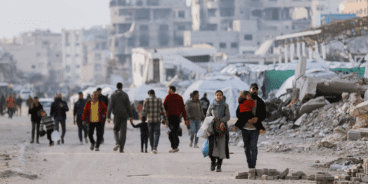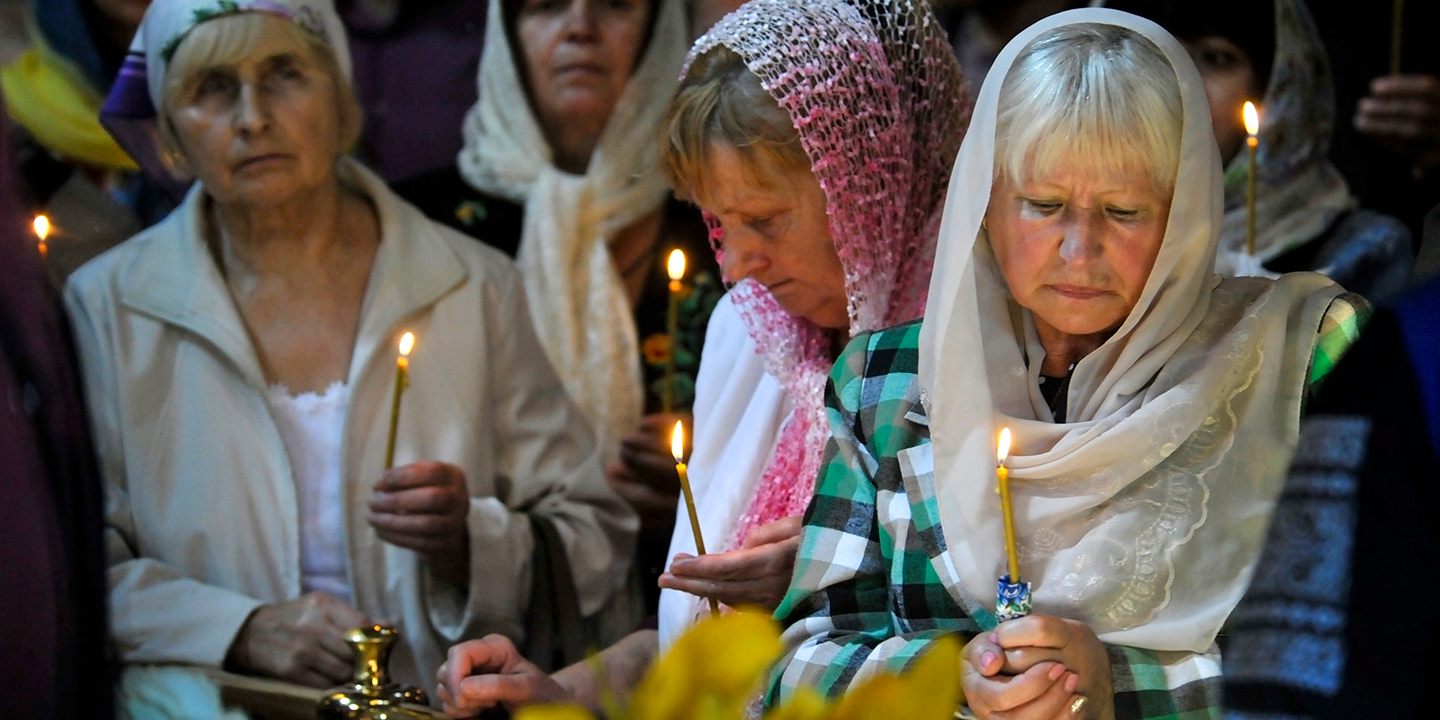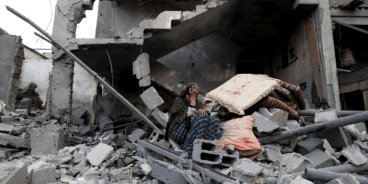

Atrocity Alert No. 309: Ukraine, World Day for International Justice and Togo
Atrocity Alert is a weekly publication by the Global Centre for the Responsibility to Protect highlighting situations where populations are at risk of, or are enduring, mass atrocity crimes.
WORLD LEADERS URGE ACCOUNTABILITY FOR ATROCITIES IN UKRAINE
On 14 July representatives from various states, regional organizations, international institutions and civil society met in The Hague for the Ukraine Accountability Conference to coordinate investigations into atrocities committed in Ukraine since Russia’s invasion nearly five months ago. During the conference, the Chief Prosecutor of the International Criminal Court, Karim Khan, called for a “reawakening” of international law, emphasizing that, “this moment of clinging to the law and applying the law in a practical way is the requirement of the hour.” Following the conclusion of the conference, several states committed to establish a “Dialogue Group on Accountability for Ukraine” to promote cooperation between ongoing justice and documentation efforts.
Daily attacks on civilians and civilian infrastructure – which may amount to war crimes – continue in Ukraine. The UN reported that as of 18 July the civilian death toll has climbed to 5,110, including 346 children, while asserting that the real death toll is likely much higher. Heavy shelling caused more than 160 civilian casualties in Ukrainian-held and Russian-held areas in the Donetsk region between 8-11 July alone. On 9 July at least 34 civilians were killed when Russian forces struck a five-story apartment building in Chasiv Yar, marking the deadliest incident so far this month and the second single deadliest attack since the war began, according to the UN. Another six civilians were killed on 18 July in the town of Toretsk when a Russian strike hit the building they were sheltering in. Meanwhile, in central Ukraine three Russian cruise missiles struck the city of Vinnytsia on 14 July, killing at least 25 people, including three children, and wounding 140 others. The missiles hit civilian infrastructure, including residential buildings and a neurological clinic servicing children with disabilities.
The humanitarian situation continues to deteriorate in areas of active conflict in the eastern Donbas regions. Reports have surfaced of Russian forces blocking the flow of humanitarian aid to areas under their control. The intentional blocking of humanitarian aid may amount to war crimes and crimes against humanity.
Sarah Hunter, Ukraine Expert at the Global Centre for the Responsibility to Protect, said, “accountability efforts for atrocities perpetrated in Ukraine are important and welcome. Nevertheless, civilians continue to endure crimes on a daily basis. All efforts must be made to halt this senseless war, including continuing to pressure Russia to end strikes on civilians and allow aid access for those in desperate need of relief.”
WORLD DAY FOR INTERNATIONAL JUSTICE
Sunday, 17 July, marked the World Day for International Justice, promoting international criminal justice and commending efforts aimed at holding perpetrators of atrocity crimes accountable. This annual commemoration is an important moment to acknowledge achievements made in fighting impunity and to raise awareness about the challenges that remain, as holding perpetrators of genocide, war crimes and crimes against humanity accountable plays an essential role in delivering justice for victims and preventing the recurrence of such crimes.
Over the past year the international community has taken numerous steps to ensure accountability for atrocities. Under the principle of universal jurisdiction, a German court convicted a Syrian ex-intelligence official of crimes against humanity and another German court opened a trial involving allegations of torture and murder by a Syrian state agent. In February the International Court of Justice held new hearings in the historic case filed by The Gambia against Myanmar (Burma) for failing to uphold its obligations under the Genocide Convention. The hybrid Special Criminal Court in the Central African Republic opened its first trial in April, representing a significant moment to advance justice domestically for victims and survivors of serious crimes committed in the country. The UN Human Rights Council established investigative mechanisms on the situations in Ethiopia, the Occupied Palestinian Territory, including East Jerusalem, and in Israel, and Ukraine. These investigative mechanisms may serve as an important deterrent and inhibit the potential commission of further atrocities, as well as put potential perpetrators on notice that their violations will be subject to ongoing international scrutiny.
This year also marks the 20th anniversary of the entry into force of the Rome Statute of the International Criminal Court (ICC). The ICC is the world’s first permanent international court for the investigation and prosecution of genocide, crimes against humanity, war crimes, and, since 2018 the crime of aggression. While facing many challenges, the ICC has made significant progress in holding suspected perpetrators of atrocities to account and can play a pivotal role in achieving justice for victims and survivors.
Despite the progress made, impunity prevails in far too many situations. The conflicts in Myanmar, Ethiopia, Sudan, Yemen and, most recently, Ukraine, have prompted renewed discussions on the effectiveness of international criminal justice to deter atrocity crimes. The 2021 military coups in Myanmar and Sudan are the consequence of decades-long impunity enjoyed by their security forces. In Yemen, civilians are suffering amidst a “pandemic of impunity,” and in South Sudan, the persistent lack of accountability continues to fuel resentment and has enabled the recurrence of atrocities.
The international community should ensure continued financial and political support to all efforts aimed at fighting impunity, including by building capacities of local, regional and national courts. All states should codify international crimes into domestic legislation and, where possible, pursue accountability for perpetrators under the principle of universal jurisdiction.
RAIDS IN TOGO RAISE FEARS OF SPILLOVER OF VIOLENT EXTREMISM FROM THE CENTRAL SAHEL
Between 14-15 July suspected Islamist militants killed at least 12 civilians and injured others in overnight raids on villages in Togo’s Kpendjal prefecture, close to the border with Burkina Faso. These raids were the deadliest attacks by presumed Islamist fighters in the country to date. Higher death tolls have been reported by other sources, including a local rights activist who said armed fighters killed more than 25 civilians, reportedly all men and community leaders from four villages in Kpendjal prefecture, while a local new source said 30 victims. Villagers have fled in the subsequent days, fearing another attack as the perpetrators allegedly threatened to return.
Recent deadly raids in northern Togo have raised fears over the growing risk of the spread of Islamist armed groups affiliated with the so-called Islamic State and al-Qaeda from the Central Sahel to coastal West African states – including Benin, Côte d’Ivoire, Ghana and Togo. Special Representative and Head of the UN Office for West Africa and the Sahel, Mahamat Saleh Annadif, stressed that violent extremism has “gone from being a phenomenon of isolated incidents to a very real threat in coastal countries.”
In the Central Sahel – Burkina Faso, Mali and Niger – Islamist armed groups are exploiting local grievances, the lack of governance and security provisions in the peripheral regions to control territory and impose their rule on communities. In doing so these groups have perpetrated atrocities and fueled a humanitarian and displacement crisis. Similar vulnerabilities exist in parts of the coastal countries, heightening the risk for violence.
Islamist armed groups have perpetrated several attacks in northern Togo since November 2021, primarily near the border with Burkina Faso and Benin. On 13 June the government of Togo declared a “state of security emergency” in the northern Savanes region following overnight attacks perpetrated by an al-Qaeda affiliated armed group in May that killed eight Togolese soldiers in Kpendjal prefecture. Since the declaration of the state of emergency, the government has increased its military operations in the Savanes region, with the aim of preventing militants from spilling over from southern Burkina Faso. However, counter-terrorism operations have at times put civilians at risk. On 14 July the army admitted to killing a group of civilians – all between the ages of 14 and 18 – in the northern village of Margba, Tone prefecture, after misidentifying them for members of an Islamist armed group.
Counter-terrorism operations – conducted nationally, bilaterally or collectively within the collaborative security mechanism known as the Accra Initiative – must adhere strictly to international human rights and humanitarian law to prevent civilian harm. It is essential that coastal states and the Central Sahelian governments develop a coordinated response that addresses the root causes of conflict and violence, including by accounting for the needs of local populations.
Related Content


Expert Voices on Atrocity Prevention Episode 42: Dirk Moses
